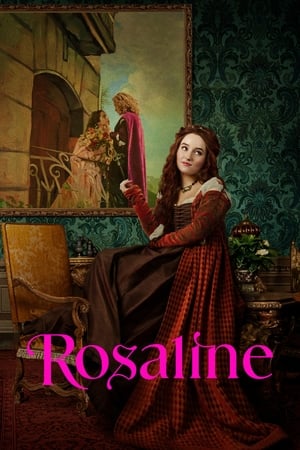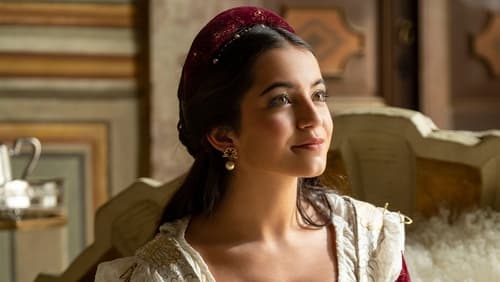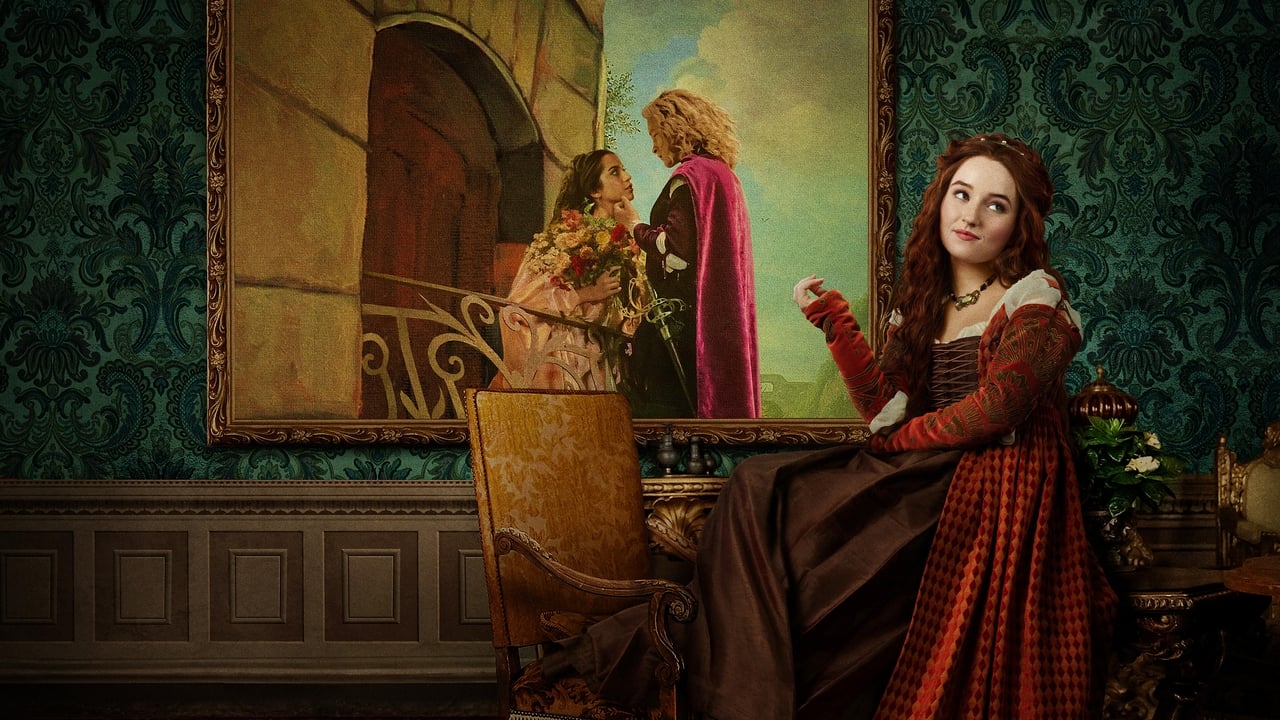
Wherefore art thou?
Rosaline, in every way, almost gets there. It almost pulls off an anachronistic attitude that feels sly and purposeful, rather than tonally muddled and wannabe-hip. It almost gives its heroine enough personality to evoke a whole human being. It almost indulges in a fun, twisty romantic sabotage plot; then, turning the tables, it almost makes a feminist point about how women should support each other while searching for their own fulfillment, rather than envying each other. Its romantic leads almost have chemistry. It almost made me want to keep watching.
The plot of Rosaline—insofar as it exists outside the idea of “Romeo and Juliet, but someone in the margins is calling its plot rushed and illogical”—begins thus: aspiring cartographer Rosaline Capulet (Kaitlyn Dever) has been enjoying a secret tryst with Romeo Montague (Kyle Allen). One night, during one of their meetings on her balcony, she invites him to meet her at a certain masquerade ball the following evening. But Rosaline never makes it to the ball, waylaid by the latest suitor her father (Bradley Whitford) has brought to tempt her to marry: the younger-and-handsomer-than-expected Dario (Sean Teale), whom Rosaline hates immediately.
With Rosaline missing from the ball, Romeo meets Juliet Capulet (Isabela Merced) and falls in love. The situation worsens for Rosaline when Juliet—who's also Rosaline’s younger, prettier, and nicer cousin—arrives to stay at her family’s estate. Soon Rosaline discovers that Romeo has been reusing his romantic lines on Juliet, and what’s a jilted lover to do? Try to break up the party, of course.

For a while, it feels like director Karen Maine has crafted a sweet little bonbon of a movie. The costumes don’t look direct-to-Hulu, and Verona here is a lush, bright place with many appealing greens and blues. It’s softly and prettily lit, without getting too golden-hour about the whole thing. The aesthetic blends nicely with the score, which is a standout element. Sure, the orchestral renditions of pop music during the ball scene are a little too Bridgerton, but the non-diegetic scoring is fantastic, coy, and playful and accented with historical instruments. Harpsichord and wooden flute stand out, and the lute and Renaissance drums also make appearances; the script may never totally sell the fusion of two time periods, but composers Ian and Sofia Hultquist do. Full of leading silences and mischievous staccato, the music can occasionally convince you that what you’re seeing is cleverer and funnier than it really is.
That’s not to fault the actors. A winning-as-usual Kaitlyn Dever deepens what the screenplay gives her. You get the sense that her Rosaline, used to being seen as a difficult woman, has decided to make it her entire identity. Dever does just as well with barbed retorts and overcompensating rudeness as she does with, inevitably, the cracks in that performed hardness. Whitford, too, manages to amuse as Rosaline’s father, and there’s nothing wrong with Merced’s sweet but determined Juliet, although Juliet ceases to be an interesting character the moment the plot transforms into a Romeo and Juliet clip show.
It's that relationship with Romeo and Juliet that really wrecks the latter two-thirds of the movie. The screenplay comes from the usually pretty reliable team of Scott Neustadter and Michael Weber (The Disaster Artist, 500 Days of Summer, et al), but after a breezy, enjoyable first half-hour, the script runs headlong into the wall of Shakespeare’s original and never finds its own footing again. A confrontation between Rosaline and Juliet promises a more direct battle between the two, but can’t pay off, since Juliet no longer has time for Rosaline; by this point she’s ensnared by the plot of her own play. A sequence where Rosaline and Dario sneak onto Montague territory predictably shifts the dynamic between the two, but doesn’t budge the overall plot arc in the least. The pacing suffers tremendously from all this. It feels at once like we’re racing through the world’s most famous tragedy and like we’re making shaggy, oddball detours.

Also, the gestures at burying hatchets and choosing female friendship don’t really land. By the time Rosaline has repented some of her scheming, a head-over-heels Juliet has started doing things like planning a secret wedding and fake deaths, and Rosaline’s sardonic reactions make Juliet seem like a ridiculous caricature.
I understand that the source novel, Rebecca Serle’s When You Were Mine, is a modern-day retelling, which might have been a good way to dodge these pitfalls. Reimagining Romeo and Juliet’s problems as contemporary teenage issues would both create a sense of novelty and fuse that altered plot firmly into Rosaline’s universe. But a movie set in the original Verona doesn’t have that buffer. Rosaline knows that the version of Romeo and Juliet happening in its background is anything but new, and so you can feel the team trying to keep as much of it offscreen as possible. I'm not sure this was the right choice. Sure, it shaves down the runtime, but it also prevents us from seeing how the new plot events of Rosaline might have worked to reshape Romeo and Juliet as characters, even subtly.
The plot issues might not have been a death knell if the movie had a solid grasp on tone, but the tone is uncertain to the point of timidity. It’s a lighthearted watch, sure, but it seems to be trying for biting wit, too. Unfortunately, that would require bite. Rosaline trying to steal Romeo back should be rich dramatic material, but the approach to her meddling is toothless, never allowing Rosaline to dislike or resent Juliet even as she tries to mislead and manipulate her. You know from the first three minutes that you’re not going to get something like The Favourite or The Great—which is fine!—but if Rosaline isn’t going to go for hard-edged or acerbic, maybe it should have aimed for goofy and ridiculous. There’s a fun little scene early on featuring a useless message courier named Steve (Nico Hiraga), who has zero sense of comportment and slouches all over the place saying, “Hey, whazzzzaahhp?” while dressed in historical garb. There’s something there. It’s not brilliant, but it does, at least, have a rock-solid sense of its own identity.
Rioghnach Robinson lives in Chicago, where she spends 70% of her waking hours dissecting the mindsets of fictional characters; the remaining 30% go toward rubbing her palms together in doomed attempts to generate heat. She writes books under the pen name Riley Redgate, most recently Alone Out Here (Disney Hyperion/2022), and she has also written for The Onion, America's finest news source. You can find her on Instagram, Tumblr, Letterboxd, or her website.
The plot of Rosaline—insofar as it exists outside the idea of “Romeo and Juliet, but someone in the margins is calling its plot rushed and illogical”—begins thus: aspiring cartographer Rosaline Capulet (Kaitlyn Dever) has been enjoying a secret tryst with Romeo Montague (Kyle Allen). One night, during one of their meetings on her balcony, she invites him to meet her at a certain masquerade ball the following evening. But Rosaline never makes it to the ball, waylaid by the latest suitor her father (Bradley Whitford) has brought to tempt her to marry: the younger-and-handsomer-than-expected Dario (Sean Teale), whom Rosaline hates immediately.
With Rosaline missing from the ball, Romeo meets Juliet Capulet (Isabela Merced) and falls in love. The situation worsens for Rosaline when Juliet—who's also Rosaline’s younger, prettier, and nicer cousin—arrives to stay at her family’s estate. Soon Rosaline discovers that Romeo has been reusing his romantic lines on Juliet, and what’s a jilted lover to do? Try to break up the party, of course.

For a while, it feels like director Karen Maine has crafted a sweet little bonbon of a movie. The costumes don’t look direct-to-Hulu, and Verona here is a lush, bright place with many appealing greens and blues. It’s softly and prettily lit, without getting too golden-hour about the whole thing. The aesthetic blends nicely with the score, which is a standout element. Sure, the orchestral renditions of pop music during the ball scene are a little too Bridgerton, but the non-diegetic scoring is fantastic, coy, and playful and accented with historical instruments. Harpsichord and wooden flute stand out, and the lute and Renaissance drums also make appearances; the script may never totally sell the fusion of two time periods, but composers Ian and Sofia Hultquist do. Full of leading silences and mischievous staccato, the music can occasionally convince you that what you’re seeing is cleverer and funnier than it really is.
That’s not to fault the actors. A winning-as-usual Kaitlyn Dever deepens what the screenplay gives her. You get the sense that her Rosaline, used to being seen as a difficult woman, has decided to make it her entire identity. Dever does just as well with barbed retorts and overcompensating rudeness as she does with, inevitably, the cracks in that performed hardness. Whitford, too, manages to amuse as Rosaline’s father, and there’s nothing wrong with Merced’s sweet but determined Juliet, although Juliet ceases to be an interesting character the moment the plot transforms into a Romeo and Juliet clip show.
It's that relationship with Romeo and Juliet that really wrecks the latter two-thirds of the movie. The screenplay comes from the usually pretty reliable team of Scott Neustadter and Michael Weber (The Disaster Artist, 500 Days of Summer, et al), but after a breezy, enjoyable first half-hour, the script runs headlong into the wall of Shakespeare’s original and never finds its own footing again. A confrontation between Rosaline and Juliet promises a more direct battle between the two, but can’t pay off, since Juliet no longer has time for Rosaline; by this point she’s ensnared by the plot of her own play. A sequence where Rosaline and Dario sneak onto Montague territory predictably shifts the dynamic between the two, but doesn’t budge the overall plot arc in the least. The pacing suffers tremendously from all this. It feels at once like we’re racing through the world’s most famous tragedy and like we’re making shaggy, oddball detours.

Also, the gestures at burying hatchets and choosing female friendship don’t really land. By the time Rosaline has repented some of her scheming, a head-over-heels Juliet has started doing things like planning a secret wedding and fake deaths, and Rosaline’s sardonic reactions make Juliet seem like a ridiculous caricature.
I understand that the source novel, Rebecca Serle’s When You Were Mine, is a modern-day retelling, which might have been a good way to dodge these pitfalls. Reimagining Romeo and Juliet’s problems as contemporary teenage issues would both create a sense of novelty and fuse that altered plot firmly into Rosaline’s universe. But a movie set in the original Verona doesn’t have that buffer. Rosaline knows that the version of Romeo and Juliet happening in its background is anything but new, and so you can feel the team trying to keep as much of it offscreen as possible. I'm not sure this was the right choice. Sure, it shaves down the runtime, but it also prevents us from seeing how the new plot events of Rosaline might have worked to reshape Romeo and Juliet as characters, even subtly.
The plot issues might not have been a death knell if the movie had a solid grasp on tone, but the tone is uncertain to the point of timidity. It’s a lighthearted watch, sure, but it seems to be trying for biting wit, too. Unfortunately, that would require bite. Rosaline trying to steal Romeo back should be rich dramatic material, but the approach to her meddling is toothless, never allowing Rosaline to dislike or resent Juliet even as she tries to mislead and manipulate her. You know from the first three minutes that you’re not going to get something like The Favourite or The Great—which is fine!—but if Rosaline isn’t going to go for hard-edged or acerbic, maybe it should have aimed for goofy and ridiculous. There’s a fun little scene early on featuring a useless message courier named Steve (Nico Hiraga), who has zero sense of comportment and slouches all over the place saying, “Hey, whazzzzaahhp?” while dressed in historical garb. There’s something there. It’s not brilliant, but it does, at least, have a rock-solid sense of its own identity.
Rioghnach Robinson lives in Chicago, where she spends 70% of her waking hours dissecting the mindsets of fictional characters; the remaining 30% go toward rubbing her palms together in doomed attempts to generate heat. She writes books under the pen name Riley Redgate, most recently Alone Out Here (Disney Hyperion/2022), and she has also written for The Onion, America's finest news source. You can find her on Instagram, Tumblr, Letterboxd, or her website.
Categories: comedies, coming-of-age, shakespeare, teen movies






